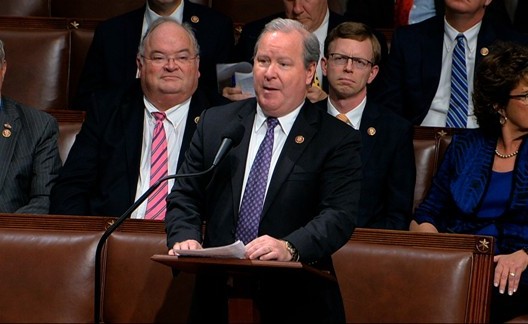| 1/18/2024: [South Carolina] Rep. Jeff Duncan (R) will not seek reelection [WSPA News 7] |

Photo credit: Jeff Duncan
Duncan is a 7-term Congressman, first elected in 2010. He lost the primary that year, but won the runoff vs. future "moderate" state legislator Richard Cash. Cash is already being rumored as a candidate for the now-open congressional seat. Cash's lifetime conservative rating in the SC Senate is in the low-70s, which is squish territory. Duncan has a lifetime conservative rating of 97%. Tags:
U.S. House
2024
South Carolina
Jeff Duncan
Retirement
Media double standard
|
| 1/9/2024: Another One Bites the Dust.... But This is 2024, Not 2018 [RightDataUSA] |

Photo credit: fox59.com
Seemingly not a day goes by without another incumbent House Republican announcing that he will not be running for re-election this year. Yesterday it was 7-term moderate Republican Larry Bucshon of Indiana deciding to hang it up at the end of the year. These announcements are causing significant pearl-clutching among GOP voters who are beginning to anticipate a 2018-style annihilation in the House; Republicans lost 41 seats that November (plus one more in a prior special election) and went from a 47-seat majority to a 37-seat deficit. Many of the Fainthearted Fifty-One were squishy liberal or "moderate" Republicans who in 2017 and 2018 found themselves caught between a rock and a hard place. Being on the left flank of the Republican party, they despised President Trump to varying degrees and were not pleased to be in a position where many of their constituents, and the conservative GOP base as a whole, expected them to help Trump's legislative agenda. Their own agenda was to do their best to ensure that Trump would be a one-term President. The squishes had an unpalatable choice to make about running again: they could run and risk being embarrassed at the polls, since they felt that the 2018 midterms were shaping up to be a bloodbath; or they could run and maybe win. However that outcome would perhaps be even more unpalatable than losing -- what with Trump still in the White House. Congressmen have massive egos too, just like senators and presidents, and Trump was using up all the oxygen in the room. Giving up a powerful, lucrative and cushy job is not an easy thing to do, and these squishes were truly on the horns of a dilemma: how best to stop Trump? Thanks to Trump's media-driven unpopularity, the 2018 midterms were indeed heading in the direction of a rout at the polls. The decision to go in the tank was likely made at the highest levels of the dominant liberal wing of the GOP. The RINOs, who are never comfortable in the majority anyway, greatly preferred to sacrifice control of the House after 2018 -- by sacrificing several Republican members -- in order to no longer be in a position to help the President. By conceding and even welcoming defeat, the GOP liberals also terminated expectations from pesky conservative voters ("What can we do? We don't have control anymore! Please send us money!"). This maneuver not only thwarted the Trump agenda in Congress, but began the Trump persecution which commenced as soon as the new Congress was sworn in during January of 2019. Now some people believe we're witnessing it all again in 2024, with the GOP liberals fearing that Trump might regain the presidency. If that happens, they want to be sure that Democrats have House control so that Trump's "Revenge Tour" is stymied as much as possible. However these recent retirements are not at all like those of 2018, where RINOs in marginal districts ran screaming for the exit and hoped -- or even said aloud -- that they wished for Democrats to win in their districts. So far this year, not one GOP retirement is likely to result in the loss of a House seat. The lone Rat pickup will probably be NY-3, George Santos' old district, and he was not a "retiree". On the other hand, several of the districts which Democrats are abandoning are golden pickup opportunities for the Republicans. These potential pickups include three districts in North Carolina, where the Rats are whining because the illegal partisan Democrat gerrymander which was mandated in 2022 has been replaced by a lawfully-created district map which favors Republicans. It appears that -- at least for now -- the new map will be used in 2024 and beyond. The open House seats in 2024 which are most prone to shifting from bad to good are shown below along with Charlie Cook's Partisan Voting Index. PVI's for North Carolina are estimated. Then there are slightly left-leaning districts which are ripe for Republican pickups, although that outcome is not necessarily probable:
Those last three aren't particularly likely, but they are in the ballpark. As far as the Republican departures from Congress only NY-3, which is rated as D+2, is a likely loss at this moment. The others range from utterly safe holds to very likely safe; the most marginal pair of open Republican districts are in Colorado -- CO-3 (Boebert) and CO-5 (Lamborn) -- and those are R+7 and R+9 respectively. No matter how big the Democrats talk -- and spend -- the GOP is obviously solidly favored in R+7 and R+9 districts; if they start losing those then they are in real trouble no matter how many incumbents do or do not run. One way in which conditions in 2024 are similar to 2018 is that partisan Democrat gerrymanders will affect the political landscape. Around 2015, black-robed tyrants in Virginia and Florida dictated that Republicans must lose seats in the House and Democrats must gain. Three or four seats in those two states were affected. Then in 2018 the Pennsylvania Democrat Supreme Court waved its magic wand and flipped four more seats to the Democrats. In 2020, similar judicial machinations in North Carolina caused another two House seats to go from R to D; Liberal hysteria aside, the new map for 2024 in the Tarheel State is just barely undoing the effects of the Democrat gerrymander from 2020. The GOP obliteration in 2018 was far more thorough than Democrat gerrymandering alone could account for, even if a new Democrat trick called "ballot harvesting" was factored in. That new technique was used in California to flip five seats from blue to red (note: proper color usage). There was also the implementation of Rigged Choice Voting in Maine, which caused a Republican defeat that would not have occurred had the votes been counted in the normal manner. Many of the losses from 2018 were recouped in 2020, perhaps because the GOP tried a little harder to win at the House level (now that Trump was safely on his way out) and even more seats were regained in 2022. In November of 2020 the Republicans won 213 House seats to 222 for the Democrats. As noted above, judicial fiat alone resulted in at least 9 or 10 seats in four states being gifted to the Democrats in 2018 and 2020. Take away those 9 or 10 from the Democrats and put them back on the Republican side where they belonged, and who controls Congress in 2021 then? That's right. Quite a bit of the "Dementia Hitler" [credit: Scott Adams] agenda which was inflicted upon America in 2021 and 2022 could not have happened without Democrats having full control of the House and voting in complete lockstep for their President in a manner which Republicans never managed to do when Trump was in office. Back to 2024: Of course the handful of GOP pickups in North Carolina will be offset (and then some) by an upcoming hyper-partisan Democrat gerrymander in New York. Other liberal gerrymanders have already occurred in Alabama and Louisiana, with more to come between now and November -- and probably even after November. But the subject here concerns retirements and for the time being no New York Republican incumbents have thrown in the towel although they are fully aware of what's coming. A few of them probably will fold though, once the new map is finalized. There is no shortage of vulnerable incumbents in both parties who will be running for re-election in 2024. Those districts are where partisan control of Congress will be decided. The probability of the GOP retaining control of the House in November is 50-50 at best as things stand now. If they lose, the retirements which have been announced up to now will not have been the primary factor in that loss. The net effect of all departures is helping Republicans -- even one of the GOP shifts (Boebert from CO-3 to CO-4) actually helps their chances of holding one district while not hindering their chances in the other one. However, if we begin to see Republicans from marginal districts cashing in their chips even without the spectre of Democrat gerrymandering forcing their hands, then it might be time to start worrying. That sort of thing was exceedingly common in 2018 but hasn't happened at all in 2024 yet. Tags:
U.S. House
2024
Retirements
Panic
Calm down
|